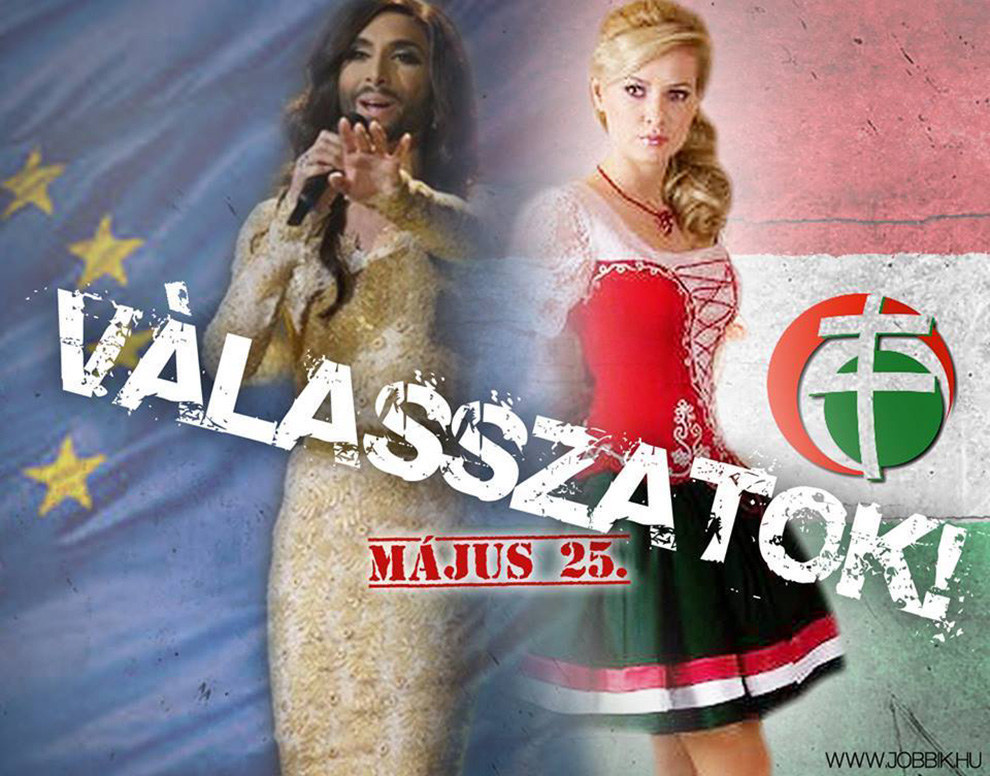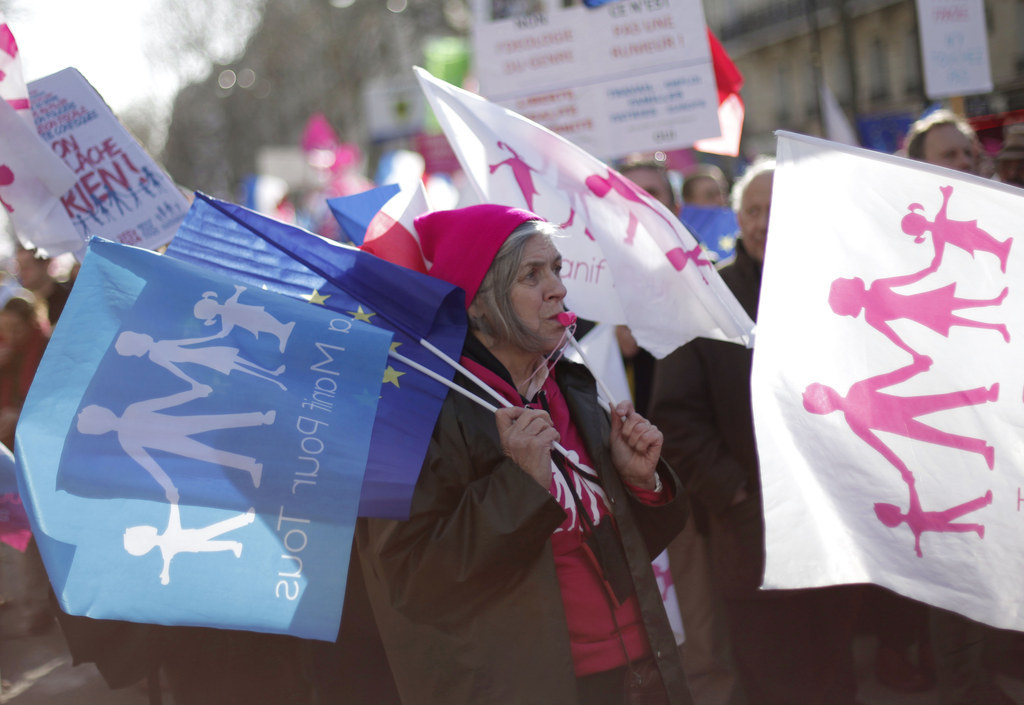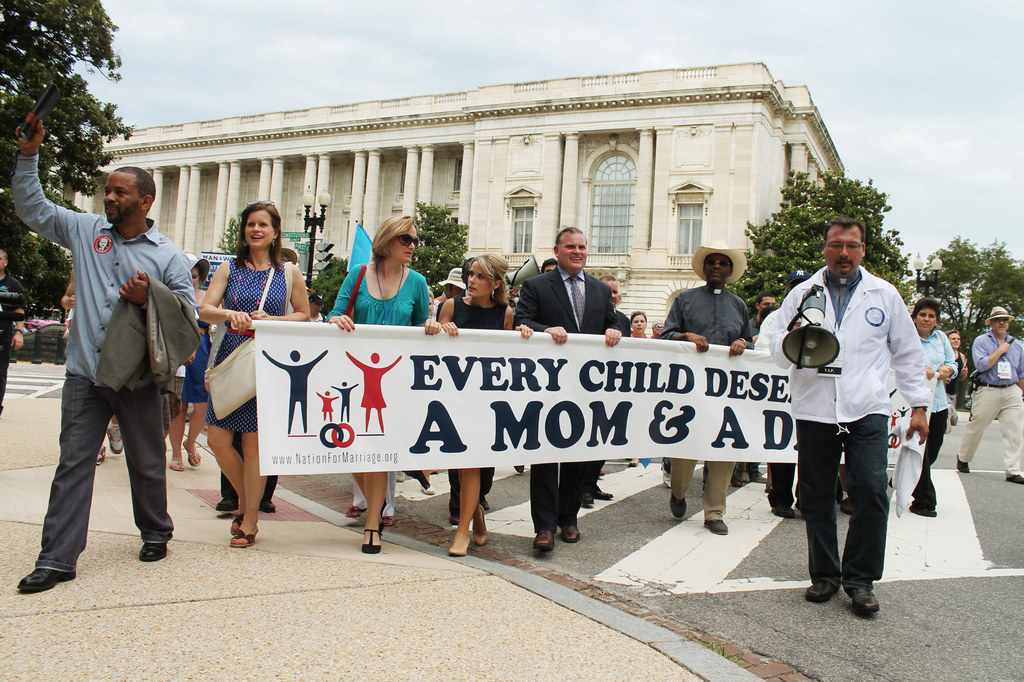The Rise Of Europe's Religious Right
“For too long a time in Europe, pro-life people did not really say clearly and directly what they believe." After years on the margins of European politics, social conservatives are learning to fight back.

bpperry / Getty Images / iStockphoto
ROME — On a hot Friday in late June, the walls of a 15th-century marble palace in a secluded corner of the Vatican were lit up with the face of
Breitbart News Chairman Steve Bannon.
"We believe — strongly — that there is a global tea party movement," declared Bannon, who took over the American conservative new media empire after the death of its founder, Andrew Breitbart, in 2012. Speaking via Skype to a conference on Catholic responses to poverty, he said, "You're seeing a global reaction to centralized government, whether that government is in Beijing or that government is in Washington, D.C., or that government is in Brussels… On the social conservative side, we're the voice of the anti-abortion movement, the voice of the traditional marriage movement."
Events across the Atlantic do look familiar to American eyes: an uprising against long-established parties in Brussels amid economic stagnation. But these elements have been around a long time in European politics. What is new — and what feels so American — is represented by the group Bannon was addressing: Europe is getting its own version of the religious right.
"There is an unprecedented anger because the average citizen [sees] what is being done in their name without their consent," said Benjamin Harnwell, who founded the group that organized the conference, called the Human Dignity Institute. Harnwell is a former aide to a longtime Eurosceptic member of the European Parliament, who founded the organization in 2008 to promote the "Christian voice" in European politics. It is one of many new groups that have sprouted on the continent in recent years with missions they describe as "promoting life," "traditional family," and "religious liberty" in response to the advance of laws to recognize same-sex marriage and abortion rights. Some are technically secular organizations, but their strength, their leaders concede, largely comes from churchgoers.
The analogy with the tea party isn't perfect for these groups, and some bristle at the comparison because they aren't uniformly conservative on other issues. Harnwell prefers "silent majority," but said he draws inspiration from the tea party movement because they also see their battle in part as a fight with a political establishment that has long ignored them.
These groups are still learning to work together, but after years on the political margins in much of Europe, they have suddenly begun flexing political muscles that progressives — and maybe social conservatives themselves — never knew they had. They have made themselves a force to be reckoned with in Brussels by learning key lessons from American conservatives, such as how to organize online and use initiative drives. European progressives, who long thought debates over sexual rights had mostly been settled in their favor, were blindsided.
"A bomb with a long fuse has been lit," said Sylvie Guillaume, a French MEP supportive of abortion rights and LGBT rights, who recently stepped down as vice chair of the largest center-left bloc in the European Union's parliament. "We don't know what's going to happen."

Jobbik
One month before Bannon addressed the Human Dignity Institute, elections for the European Parliament sent a shockwave through the political establishment in Brussels. Far-right parties calling for an end to the European Union doubled their numbers to hold around 20% of seats. Parties like France's National Front and Britain's UKIP won pluralities in their countries.
Some of these parties ran on explicitly anti-LGBT platforms, particularly in Eastern Europe. (Hungary's ultranationalist Jobbik Party, for example, printed posters featuring a blond woman with a Hungarian flag standing opposite drag Eurovision champion Conchita Wurst with an EU flag, along with the caption: "You Choose!") For the most part, though, issues dear to social conservatives were a side issue in elections driven heavily by economic frustration. Some on the far right even support LGBT rights, most notably Geert Wilders of the Dutch Party for Freedom, who has tried to recruit LGBT voters for his anti-Muslim, anti-immigrant platform.
Social conservatives made themselves a force months before the election. In December, the European Parliament took up a resolution known as the Estrela Report that called on member states to provide comprehensive sex education in schools, ensure access to safe abortions, and take other steps that its supporters consider basic to safeguarding sexual health and rights. The resolution would have had no practical impact — the EU's own rules bar it from regulating such issues — and its supporters considered it consistent with previously adopted resolutions. The vote was expected to be perfectly routine.
Then, as if someone had thrown a switch, emails started pouring into MEPs' offices calling for the resolution to be rejected weeks before the final vote on Dec. 10. After an acrimonious floor debate, the center-right bloc helped defeat the Estrela Report by a small margin in favor of a conservative alternative that essentially said the EU has no business talking about these issues. The result stunned progressives, who couldn't recall another time that the parliament had rejected language supportive of reproductive rights.
In a sense, someone had indeed thrown a switch. A few months earlier, a new online petition platform called CitizenGo sent out its first action alert.
CitizenGo was conceived of as a kind of MoveOn.org for conservatives. It was based in Spain, but it had aspirations to be a global platform and now has staff working in eight languages, with plans to add Chinese and Arabic. It has an organizer in the U.S., too, named Gregory Mertz, who works out of the Washington offices of the National Organization for Marriage — Mertz actually wrote some of CitizenGo's Esterla Report petitions. In the weeks leading up to the Estrela vote, several petitions appeared on CitizenGo, garnering 40,000 signatures here, 50,000 there.
These kinds of campaigns are so common in the U.S. that they are little more than background noise. But they were new in Brussels, especially in the hands of conservatives. Grassroots mobilization on sexual rights hadn't been common on either side, and progressive advocacy groups had won many important victories relying heavily on an elite lobbying strategy.
MEPs had no idea what hit them and many of them folded, said Neil Datta, of the European Parliamentary Forum for Population and Development, which promotes reproductive rights.
"If you have a big cannon, the first [time] you shoot it, everyone runs away scared," Datta said.
CitizenGo's founder, Ignacio Arsuaga, had spent more than a decade adapting online organizing techniques from U.S. to Spanish politics before launching the group. He had been drawn into internet advocacy while studying at Fordham Law School in New York in the late 1990s. He had been "amazed" by MoveOn.org, he said in a phone interview from Spain, and he began signing petitions by groups such as the Christian Coalition, Americans United for Life, and other organizations that were "defending the rights of religious people — specifically Catholics — to express our faith in the public sphere."
"That's real democracy — that's what I lived in the U.S.," Arsuaga said. "Spanish citizens aren't used to participating. They're used to voting to every four years, and that's it."
To change this, he created an organization called HazteOír (a name that means "make yourself heard") in 2001. It ran some campaigns throughout the early 2000s, often under separately branded sites, but it was the group's mobilization against a 2010 bill to liberalize abortion laws passed by Spain's socialist government that made the group a beacon to conservatives around the world. It helped get hundreds of thousands of protesters on the streets of Madrid and kept up the drumbeat through the 2011 elections when the conservative party Partido Popular won control. Its efforts appear to have paid off. In December 2013, the cabinet approved legislation that opponents say would give Spain the most restrictive abortion laws of any democracy in the world, and it seems to be on track for final approval by the parliament this summer.
Arsuaga has steadily been working to build a broader movement. His group hosted the 2012 World Congress of Families in Madrid, a global summit of social conservative leaders organized by an institute in Rockford, Ill. It bussed supporters across the border to France in 2013 when a new organization, La Manif Pour Tous (Protest for All), organized large protests against a marriage equality law reminiscent of Spain's anti-abortion protests.
The protests organized by these two groups were a turning point for conservatives throughout Europe, said Luca Volontè, a former Italian MP who now runs a social conservative foundation in Rome and sits on CitizenGo's board. They showed that a progressive victory was not inevitable. And, in their aftermath, conservatives have won victories, especially in Eastern Europe — in recent months, Croatia and Slovakia both enacted marriage equality bans in their constitutions.
"So many people in Europe are standing up, because this ideology appears and [is] felt, really, as totalitarian," Volontè said, referring to advances for marriage equality.
La Manif Pour Tous is now following the same path as HazteOír, continuing the fight against marriage equality in France even though it became law in May 2013 and reorganizing itself as a permanent, international organization. The group launched a "Europe for Family" campaign in the lead-up to the EU elections in May, and 230 French candidates signed its pledge opposing marriage equality, trans rights, and sex education.
Twenty-three signatories won won seats in those elections, 11 of them members of the far-right National Front.

Thibault Camus / AP
The suddenness with which social conservatives became a force in Brussels has many progressives speculating that they are the creations of American social conservatives seeking to "export the culture wars."
"As far as I understand [social conservative groups] have quite some money in them [from] the U.S., similar to all those missionary and evangelical groups that do work in Uganda," said Ulrike Lunacek, an Austrian Green Party MEP who is now vice president of the European Parliament. Lunacek, who co-chaired the Parliament's Intergroup on LGBT Rights in the last session, authored a report on LGBT rights that groups like CitizenGo and La Manif Pour Tous tried unsuccessfully to defeat this winter.
A review of tax disclosures conducted by the progressive advocacy group People for the American Way found that several U.S. groups — many of which boomed in the 1990s — had recently invested in conservative drives across Europe: The American Center for Law and Justice, founded by Pat Robertson, sent $1.1 million to its European branch, the European Center for Law and Justice, in 2012, which is the most recent year for which tax disclosures are available. Another group founded by well-known American social conservatives called the Alliance Defending Freedom spent more than $750,000 on European programs that year. The Federalist Society, which promotes conservative legal philosophy, reported spending nearly $800,000 in "conferences and seminars" in Europe that year. Personhood USA, a small Colorado-based group that has tried to pass ballot measures that would give fetuses the legal status of "persons" — a strategy for rolling back abortion rights that is controversial even among pro-life activists — poured $400,000 into Europe in 2012, just after one of its ballot measures went down in flames in Mississippi. (Personhood USA President Keith Mason declined to answer questions from BuzzFeed about which organizations received the funds or what they were used for.)
But while there are links to the U.S., the movement is very much homegrown. Arsuaga said neither HazteOír nor CitizenGo get funding from U.S. groups — and they don't need it. Arsuaga said 99% of HazteOír's 1.9 million euro ($2.5 million) annual budget comes from donations from Spanish citizens. CitizenGo has been raising 30,000 to 40,000 euros (roughly $40,000 to $55,000) each month from the 1.2 million members it's signed up worldwide since its October launch.
Today, American ties seem much more about a shared vision to build a global conservative movement rather than leaning on stronger and wealthier U.S. partners for support.
Arsuaga, Volontè, and La Manif Pour Tous President Ludovine de La Rochère were all in Washington on June 19 to support the National Organization for Marriage's March for Marriage. Their more important business, however, might have been in a closed-door summit the next day, where representatives of around 70 countries met to discuss creation of an International Organization for Marriage, according to Volontè and another participant. A follow-up meeting is planned for next year.

Flickr: Elvert Barnes / Creative Commons / Via flic.kr
Many LGBT rights supporters mocked the March for Marriage's paltry turnout. So these Europeans appeared as if they were there to encourage a beleaguered movement, not the other way around — they now possess the vigor that has evaporated from the U.S. movement as opposition to marriage equality has collapsed.
European social conservatives contend that they may have a new energy and sophistication, but Europeans have never been pro-abortion rights or pro-marriage equality. Dissenters just weren't given the floor, and they didn't know how to fight back. "[We] didn't know how to arrive here at the European [Union] level and make their voice heard in parliament," said Sophia Kuby, director of a four-year-old organization based in Brussels, European Dignity Watch.
Polling data doesn't appear to bear this out, at least in Western Europe. Support for marriage equality ranges between 52 and 79% in all seven Western European countries included in a June Ipsos poll. Less than a third of respondents from the two Eastern European countries included — Poland and Hungary — support same-sex marriage (and both countries have banned it in their constitutions), but more than 50% support some form of legal recognition for same-sex couples. Opinion seems to range more on abortion, which is available in most countries at least before 12 weeks, though waiting periods and other restrictions are not uncommon. An April Pew study found substantial pluralities in countries including France, Spain, and the Czech Republic say they believe abortion is "morally acceptable," while there are even more lopsided pluralities saying abortion was "morally unacceptable" in places such as Poland and Greece.
But anti-abortion activists effectively used a new mechanism for direct democracy that the EU introduced in 2012 — called the European Citizens Initiative (ECI) — to make a show of popular support. One of the first ECIs ever launched, dubbed "One of Us," was a proposal to cut off EU funding to any activity that destroys a human embryo, which in practical terms would mean ending support for stem cell research and foreign aid to family planning programs that perform abortions. If organizers could get at least 1 million signatures from seven countries, the EU's executive body, the European Commission, would have had to hold a hearing on it.
The signature drive was led by Grégor Puppinck of the European Center for Law and Justice, but the continental campaign itself was funded entirely by Spanish and Italian foundations. It quickly sailed past the 1 million signature hurdle, collecting over 1.8 million signatures from more than 20 countries by the time the hearing was held on April 9. Despite this impressive show of popular support, there was little doubt that the commission would reject the proposal even as the witnesses for One of Us walked into the hearing room — Science Commissioner Máire Geoghegan-Quinn had said as much in a January press conference.
The commission summarily dismissed the proposal in a seven-page statement issued on May 28 — just three days after the European elections, which left some organizers feeling like the commission was deliberately trying to prevent it from affecting the vote.
But that doesn't mean it was a defeat for opponents to abortion rights. Well before the process had come to an end, the One of Us campaign signalled on its website that it had bigger goals than just changing EU funding policy.
The drive "could be a starting point of a new Europe-wide mobilization of the pro-life movement," the site said. "Every experience we collect here can be used for campaigns on other pro-life issues in further course. In that sense, it can be expected that the outcome may be very enduring."
It also taught anti-abortion rights activists that they didn't have to pull their punches.
"For too long a time in Europe, pro-life people did not really say clearly and directly what they believe because [they feared] it was too much" for most Europeans to accept, Puppinck said in an interview in his Strasbourg office. "We are more direct, more open, more clear, we don't really try to negotiate on the truth…. This is why, for us, the most important [thing] is to be able to speak."
And from a political standpoint, the rejection of the One of Us initiative may have been a blessing for social conservatives hoping to build a movement. The U.S. anti-abortion movement was built in response to the 1973 Supreme Court decision establishing abortion rights, a ruling that thrust abortion into the center of American politics for the last 40 years. And they can now frame it as a question, not just abortion.
That's exactly how the Parliament's largest bloc, the center-right European People's Party, is already poised to embrace One of Us' cause. The EPP chair, German MEP Manfred Weber, told BuzzFeed he was "disappointed" that the European Commission did not act "when there are so many people standing behind an initiative."
"We have to bring people closer to the European process," Weber said, adding that the EU must not go beyond its mandate. "Europe should not be the political body which is intervening … in this question of family rights, of abortion. Very crucial and very important."
This battle now heads to the courts. On Friday, Puppinck filed a challenge before the EU's judicial arm asking that it take away the European Commission's veto power over initiatives. The suit "is not only about the right to life, but firstly about democracy," Puppinck stated in a press release announcing the suit.
In this fight, Puppinck said, "You can really say it's the opposition between the people and the elite."
J. Lester Feder is a world correspondent for BuzzFeed News and is based in Washington, DC.

Geen opmerkingen:
Een reactie posten
Opmerking: Alleen leden van deze blog kunnen een reactie posten.